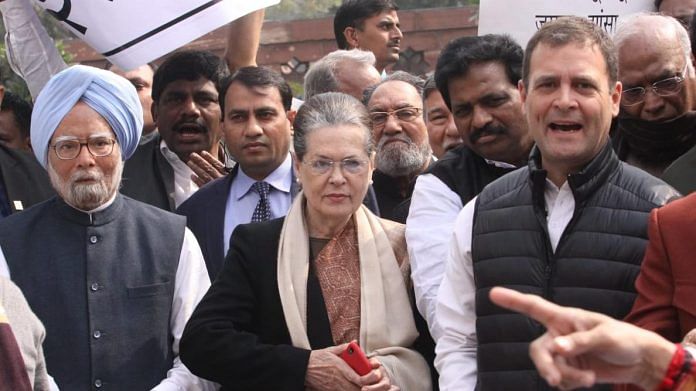Why Congress can’t
Yogendra Yadav | President of Swaraj India
The Indian Express
Yadav explains the rationale behind his statement on a TV show that “Congress must die”, which triggered strong responses. He clarifies that this was not an “emotional outburst” to the exit polls and that he has no animosity towards Congress leaders. He finds it wanting on the “core issue” of whether it can act as a “bulwark” against the “onslaught” on the foundations of the country. In the last five years, Congress has failed to “mobilise” any mass movement on agrarian address, rising unemployment, the ill-effects of GST and demonetisation. Yadav says Rahul Gandhi “carried little appeal” against Modi’s “communicative onslaught”.
Legislative assemblies should be elected at midterm of Lok Sabha
Alston D’Souza | Researcher at Centre for Civil Society &
Archit Puri | Delhi-based researcher
Hindustan Times
On the issue of holding simultaneous Lok Sabha and assembly elections, D’Souza and Puri suggest instead a midterm system for elections to all assemblies (barring Jammu & Kashmir) at the half way mark of 30 months. Simultaneous polls challenge the federal system and reduce a politician’s “true incentive for performance” i.e, election pressure. A midterm election, on the other hand, will have many advantages: it serves as a “referendum” on “incumbent” parties. It will prevent “stalling of policies”, avoid constant campaigning, strengthen federalism and reduce the “honeymoon period effect” where the ruling party at the Centre or state gains “significantly” when other polls take place in that grace period.
Time to rebuild India’s secularism
Harsh Mander | Human rights worker, writer and teacher
The Hindu
Mander believes that of all that lies broken in India today, the most damaged is “secular democracy”. He says opposition leaders have spoken of many issues but rarely of lynching and violence against Muslims, Christians and Dalits, or secularism. To Mander, secularism is the “soul” of the Constitution but today the well-being of minority religions and caste hinges on the consent of the upper caste and patriarchal Hindu. The greatest danger to India’s secular fabric is not Modi’s personality but the spread of RSS into the social life of all Indians. He believes that irrespective of the outcome on 23 May, the fight to “defend” and “fortify” secularism rests with the people.
Hoodwinking India’s children
Geeta Kingdon | Professor of education economics, University of London
The Times of India
Kingdon says despite high marks secured by students in this year’s board examinations, there’s discontent that a “substantial part” of this marking system is “phoney”. This is the result of “marks inflation competition” among exam boards for reasons that include populism by certain political regimes to derive certain electoral advantage. It is also to “forestall” scrutiny when students place requests for their exam scripts through RTI queries. Kingdon says this not only crumbles public trust in exam boards but also cheats students by sending them “wrong signals” about their learning levels. It’s “unbecoming” for India to be indulging in a “large-scale open fraud” on “its own children”.
Do ‘jobs’ even matter in politics?
Mihir Sharma | Author and Fellow ORF
Business Standard
Sharma asserts that economic growth and policies including jobs have little bearing on electoral results, as can be seen with the exit polls. These, in fact, have never had any bearing on elections. Sharma argues that barring inflation, factors such as economic growth, farmers’ distress have no meaning for the voters. “What is most likely, of course, is that many elections are not fought on economic issues at all,” he says. Social mobilisation and polarisation were as important earlier as they are now. His conclusion: if these factors are indeed not important, going ahead, politicians will pay little attention to them.
Let’s not miss this opportunity to revive ‘Make in India’
Vivan Sharan | Partner, Koan Advisory Group
Mint
India’s next government will inherit a troubled economy, says Sharan. The lack of income growth for the majority of Indians has led to a drop in demand and the only way to revive this is to boost the ‘Make in India’ programme. The scheme has been “limited in ambition and scope”, he says, adding that India’s tariff led approach is reminiscent of the past. India has been focusing on trade barriers to protect domestic industry instead of incentivising the manufacturing sector. India must act fast to take advantage of the US-China trade war. The drop in investments suggests that re-orientation is contingent on re-balancing of incentives and tariff under the programme.
GST reforms, to be continued
VS Krishnan | Former member, Central Board of excise and Customs
The Economic Times
GST will need further alterations. Krishnan underlines the need to bring in more areas, including electricity, under the ambit of GST. Expansion of GST would help in rate rationalisation while procedural complexities need to be addressed. Ease of paying taxes is critical for ease of doing business. He also says that single rate for GST is a utopian idea and would raise rates for many essential products. There’s need to set up a new institution to address the institutional void at the state level. A GST secretariat, which can bring central and state officials together to hear grievances of trade and industry, is required to address the day-to-day issues.




Why should any party “ die “ ? The BJP was down to 2 in 1984, the Congress to 44 in 2014. Power will continue to alternate between them, although the regional parties are now a dominant pole as well. Yogendra Yadav is younger than me, he has no business turning senile …